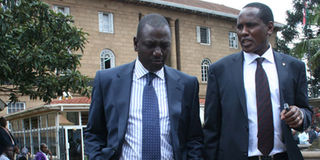Police, AG trade blame over acquittal of Ruto

PAUL WAWERU| NATION
Eldoret North MP William Ruto (left) and lawyer Martin ole Kamwaro leave court before the acquittal.
Questions are being raised about the prosecution of the fraud case against suspended Cabinet minister William Ruto. The police and the State Law Office, the government’s prosecution arm, traded accusations Wednesday over who was responsible for losing the case.
Of the witnesses that the prosecution had lined up, 13 could not be found and five died while the case was going on. Those who made it to the court became hostile to the prosecution, according to Chief Public Prosecutor Keriako Tobiko.
Both Police Commissioner Matthew Iteere and Mr Tobiko sought to clear their officers from any blame in the case that also saw Mr Joshua Kulei and Mr Sammy Mwaita set free.
Nairobi chief magistrate Gilbert Mutembei acquitted the three on Tuesday. They had been charged with fraudulently obtaining Sh272 million from Kenya Pipeline Corporation by selling it plots in Ngong Forest.
The ruling appeared to blame the CID wing of police for failure to investigate and providing the evidence.
“The contention of selling land without being procedurally excised from Ngong Forest was the basis of drafting the charges. The then Forestry minister signed the letter to hive off the forest land and 33 parcels were allocated to various firms. Consent to hive off part of the forest was obtained from the Lands commissioner.
“The prosecution failed to produce in court the then Finance Manager Hellen Njue to give her evidence on how she paid out the money. It is, therefore, clear that none of the accused ever received any money from KPC. The prosecution has failed to prove its case thus all the accused persons have no case to answer,” Mr Mutembei ruled.
Mr Iteere was categorical that CID officers carried out proper investigations, arguing, any blame for the acquittal should go to other offices.
“I believe we played our role well and the rest was left to the other players,” he said in Nairobi on the sidelines of a regional seminar on small arms and light weapons.
“You have to understand what the criminal justice system procedure really entails. It involves investigations, prosecution, the court process itself and finally the custody in prison,” he said.
The State Law Office rejected the police stance, with Mr Tobiko accusing police of conducting shoddy investigations and failing to produce witnesses.
“It is grossly unfair for the Police Commissioner to apportion blame when he knows the duty to conduct investigations, provide statements and produce witnesses in court lies with the police. I really don’t understand what he is talking about.
“The police said 13 key witnesses could not be traced. Five other key witnesses had died, which brings to 18 the number of witnesses who were not produced in court. The prosecuting counsel could not do anything,” Mr Tobiko said on phone.
He also questioned the manner in which statements were recorded.
“The case was investigated by the police and not the Attorney General’s Chambers. They are the ones who recorded statements and gathered exhibits, a duty they have to do correctly. But a number of witnesses disowned the statements and turned hostile to the prosecution, showing that the police failed in their task,” he argued.
Mr Tobiko said the State Law Office was becoming a whipping boy: “It has become a norm in Kenya to lay the blame at the AG’s office whenever suspects are acquitted, when the blame should ideally lie elsewhere.”
Police have a poor record of investigating and cracking high-profile cases. Nearly a year after the Uhuru Park blasts, in which six people died, police are yet to crack the case. The government also lost the criminal case against Constable Edward Kirui accused of killing two people in Kisumu during the post-election riots.
In 2009, five people were freed for lack of evidence over the Kiambaa massacre in Eldoret where 35 people were burnt to death in a church on December 31, 2007.




